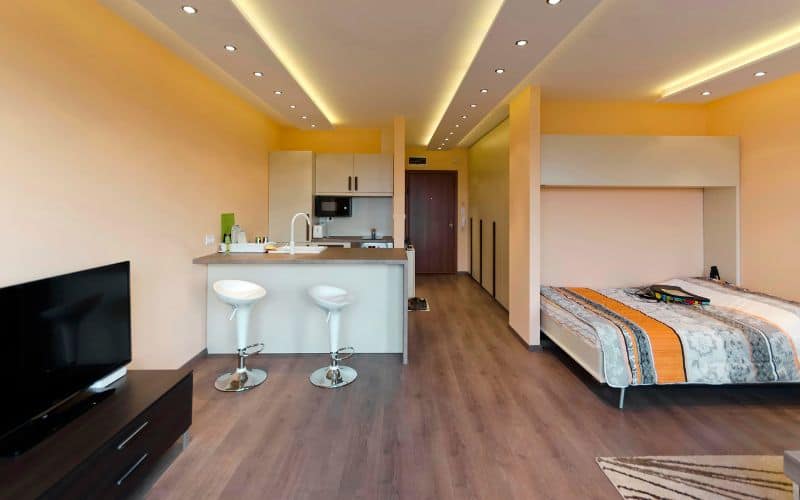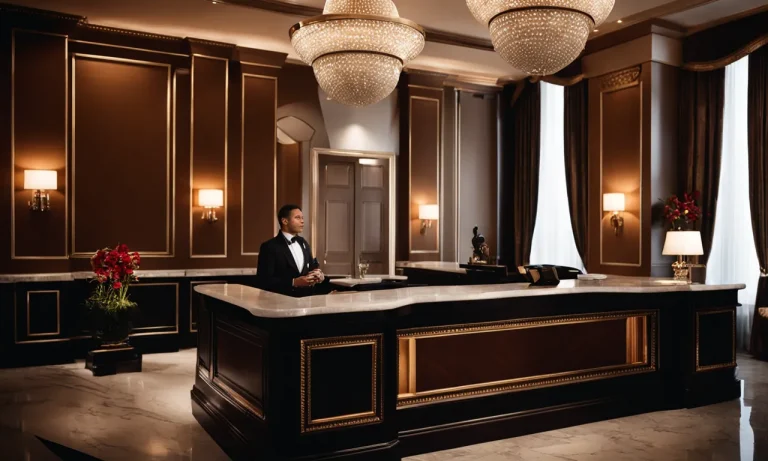When traveling frequently or dreaming of vacation home ownership, you may wonder if purchasing a hotel room or suite is possible. While not common, some hotels actually allow guests to buy individual rooms that can be used or rented out like privately owned condominiums.
So can you really buy a hotel room? While rare, some hotels do sell private residences or rooms to guests in a condo-hotel ownership model.
Purchasing a hotel room involves factors like financing, recurring fees, and usage limitations before committing to hotel real estate ownership versus traditional lodging.
Understanding Hotel Room Ownership Models
Condo-Hotels

One ownership model that allows individuals to buy a hotel room is known as a condo-hotel. This arrangement divides a hotel property into individual units, like a condominium. Owners can use their unit as a vacation home whenever they desire, and when they’re not using it, the unit is placed in the hotel’s rental program.
This allows owners to generate income from their hotel room when not using it. Condo-hotels are typically managed by a professional hotel management company, which takes care of the day-to-day operations and maintenance of the property.
This ownership model combines the benefits of owning a hotel room with the flexibility of using it as a personal vacation property.
Fractional Ownership
Fractional ownership is another ownership model that provides the opportunity to buy a hotel room. With fractional ownership, multiple individuals or families purchase shares in the hotel property, usually in increments of weeks or months.
Each owner is entitled to use the hotel room for their allotted time. Fractional ownership is a great option for those who want the benefits of hotel ownership but don’t need or want year-round access to the property.
It allows individuals to enjoy luxurious accommodations and amenities at a fraction of the cost of full ownership. Fractional ownership arrangements often include management services, ensuring that the property is well-maintained and providing a hassle-free experience for owners.
Deed or Title Details
When buying a hotel room, it’s essential to understand the legal details associated with the ownership. Sometimes, the owner receives a deed or title to the hotel room, much like a traditional property.
This type of ownership gives the owner more control and potentially greater financial benefits when selling the room. However, in other cases, the ownership is structured as a leasehold, where the owner holds a long-term lease for the hotel room.
It’s crucial to thoroughly review the legal documents and consult with a real estate attorney to understand the ownership rights and responsibilities clearly.
For more information on hotel room ownership models, visit the Condo Hotel Center website, which provides comprehensive resources and listings for condo-hotels and fractional ownership properties.
The Pros of Buying a Hotel Room

Guaranteed Availability
One of the major advantages of buying a hotel room is the guaranteed availability. When you own a hotel room, you can book it whenever you want without worrying about availability. This can be especially beneficial during peak travel seasons when finding a hotel room can be challenging.
Whether it’s a last-minute getaway or a planned vacation, having your own hotel room ensures you always have a place to stay.
Extra Space
Another advantage of buying a hotel room is the extra space it provides. Hotel rooms are typically designed to be spacious and comfortable, offering amenities such as a bedroom, living area, and bathroom.
This extra space can be particularly appealing for families or individuals who enjoy having room to spread out and relax. Additionally, owning a hotel room often provides access to other hotel facilities such as pools, gyms, and restaurants, further enhancing the overall experience.
Potential Rental Income
Buying a hotel room can also be a smart financial investment. Many hotels offer rental programs allowing owners to rent their rooms when not using them. This can provide a steady income stream and help offset ownership costs.
Depending on the location and popularity of the hotel, rental income can be quite substantial. It’s important to note that the potential for rental income may vary depending on location, hotel reputation, and market demand.
The Cons of Buying a Hotel Room
Upfront and Yearly Costs
While buying a hotel room may seem like a lucrative investment, it comes with its fair share of costs. One of the major downsides is the upfront and yearly costs involved. Purchasing a hotel room requires significant capital, which can be a barrier for many potential buyers.
Additionally, yearly expenses such as property taxes, insurance, and management fees can add up over time. These costs can eat into the potential profits and make owning a hotel room less attractive for some investors.
Limited Flexibility
Another drawback of buying a hotel room is the limited flexibility it offers. Unlike traditional real estate investments, where you can use the property as you please, owning a hotel room often has restrictions.
Most hotels have specific policies governing how the room can be used and rented. This means that as an owner, you may not have complete control over when you can stay in the room or how it is managed.
This lack of flexibility can frustrate those looking for more autonomy in their investment.
Maintenance Fees
When you buy a hotel room, you are responsible for the initial purchase price and ongoing maintenance fees. These fees cover the costs of upkeep, repairs, and renovations necessary to keep the hotel in good condition.
Depending on the hotel’s location and amenities, these maintenance fees can be substantial. It’s important to carefully consider these additional expenses before making a decision to purchase a hotel room.
Financing and Legal Considerations
Several financing and legal considerations must be considered when buying a hotel room. These factors can greatly impact your ability to make the purchase and ensure a smooth transaction.
Here are some important things to consider:
Obtaining a Loan

You may need to obtain a loan if you don’t have enough cash to buy a hotel room outright. Financing options for hotel room purchases can vary, so it’s important to explore different lenders and loan programs to find the best fit for your needs.
Banks, credit unions, and private lenders are common funding sources for hotel room purchases.
It’s important to note that obtaining a loan for a hotel room purchase can be more challenging than getting a loan for a traditional home. Lenders may require a higher down payment and have stricter lending criteria due to the unique nature of hotel room ownership.
Additionally, lenders may also consider the hotel’s financial performance as part of their evaluation process.
Understanding the Contract
Before buying a hotel room, it’s crucial to understand the contract involved in the purchase thoroughly. The contract will outline the terms and conditions of the sale, including any restrictions or obligations of owning the hotel room.
Reviewing the contract carefully and seeking legal advice to ensure you fully understand your rights and responsibilities as a hotel room owner is essential.
Some important elements to consider in the contract include the length of ownership, potential restrictions on usage or rental income, and any fees or dues associated with the hotel’s management or maintenance.
Understanding these details will help you make an informed decision and avoid any surprises down the line.
Hiring a Real Estate Lawyer
Given the complexity of buying a hotel room, hiring a real estate lawyer specializing in hotel transactions is highly recommended. A qualified lawyer can help you navigate the legal intricacies, review contracts, and protect your interests throughout the buying process.
A real estate lawyer can ensure all necessary documents are in order, conduct due diligence on the property, and negotiate on your behalf. They can also provide valuable advice on local regulations and zoning laws that may impact your ownership of the hotel room.
When hiring a real estate lawyer, choosing someone with experience in hotel transactions is important. You can ask for recommendations from other hotel owners or search for reputable lawyers through professional organizations like the American Bar Association.
Usage Rules and Restrictions
Booking Policies
When buying a hotel room, it’s important to understand the usage rules and restrictions that may apply. Most hotels have specific booking policies that guests need to adhere to. These policies can vary from hotel to hotel, but common rules include:
- Minimum and maximum stay requirements
- Advance booking timeframes
- Deposit and cancellation policies
- Occupancy limitations
It’s essential to familiarize yourself with these policies before making a purchase to ensure a smooth and enjoyable stay.
Rental Limitations
While it is possible to buy a hotel room, it’s important to note that there are often rental limitations in place. Some hotels may restrict how many nights guests can stay in their purchased room, particularly during peak seasons or busy periods.
These limitations are in place to ensure fair access to all guests and prevent monopolization of rooms.
Additionally, some hotels may restrict renting out the room to others or subletting it. This is to maintain the quality and reputation of the hotel and ensure that all guests have a consistent experience.
Accessibility
Another factor to consider when buying a hotel room is accessibility. Not all hotels allow owners to access their purchased rooms at any time. Some hotels may have specific blackout dates where owners cannot stay in their rooms.
These blackout dates are typically during high-demand periods when the hotel wants to maximize revenue by offering rooms to paying guests.
It’s important to inquire about the accessibility of the room before making a purchase to avoid any disappointments or misunderstandings.
For more information on hotel booking policies and rental limitations, visit reputable hotel booking websites such as Booking.com or Expedia.com.
Conclusion
While buying a hotel room is possible in some condo-hotel properties requires a major financial commitment. It can provide ownership perks like guaranteed bookings and extra space for frequent travelers.
However, limitations, fees, and loss of flexibility make hotel room purchase an option only suited to a narrow customer niche.






